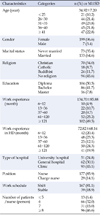Abstract
Purpose
This study was performed to investigate the effect of work environment on nursing performance and the effect of job satisfaction and empowerment on nurses performance in hemodialysis units.
Methods
Participants in this study were 206 nurses from 22 hemodialysis units in local clinics, general and university hospitals in two metropolitan areas. The work environment, nursing performance, job satisfaction and empowerment of the participants were measured using four self-report questionnaires. Data were analyzed using SPSS/WIN 18.0.
Results
Nursing performance correlated significantly with work environment, job satisfaction, and empowerment in the participants. Predictability of work environment for nursing performance was 28%. Job satisfaction and empowerment showed complete mediating effects, but not moderating effects in the relationship of work environment and nursing performance in the participants.
Conclusion
Findings indicate that work environment is an important variable affecting nursing performance in nurses in hemodialysis units and that job satisfaction and empowerment are mediating variables in the relationship of work environment and nursing performance in nurses in hemodialysis units. Improvements in the work environment are needed to induce the high job satisfaction and empowerment that can lead to improvement of nursing performance.
Figures and Tables
Table 2
Work Environment, Job Satisfaction, Empowerment and Nursing Performance according to Participants' Characteristics (N=206)

Table 3
Relationship among Work Environment, Job Satisfaction, Empowerment and Nursing Performance in Participants (N=206)

References
1. The Korean Society of Nephrology. Medical information for hemodialysis patients [Internet]. Seoul: The Korean Society of Nephrology;2006. cited 2014 July 29. Available from: http://www.ksn.or.kr/qna.php?code=qna&category=01&number=202013.
2. Kim MS, Shin MJ, Kim MK, Kim JH, Park SM, Woo HJ, et al. A study on the job activity analysis of the hemodialysis nurses. J Korean Acad Nurs Adm. 2000; 6(3):303–317.
3. Ko YK, Park BH. The relationship of the nursing work environment and nursing outcome among it's nurses' and content analysis of nurses workload. Korean J Hosp Manage. 2014; 19(1):54–67.
4. Park SJ. Task performance and job satisfaction of nurses in non-life insurance companies. J Korean Acad Nurs Adm. 2001; 7(3):487–495.
5. Oh EH, Chung BY. The effect of empowerment on nursing performance, job satisfaction, organizational commitment, and turnover intention in hospital nurses. J Korean Acad Nurs Adm. 2011; 17(4):391–401. DOI: 10.11111/jkana.2011.17.4.391.
6. Lake ET, Friese CR. Variations in nursing practice environments: Relation to staffing and hospital characteristics. Nurs Res. 2006; 55(1):1–9.
7. Park EJ, Kim YH. A grounded theory-based approach to practice adaptation process of hemodialysis unit nurses. J Korean Acad Nurs Adm. 2013; 19(1):128–137. DOI: 10.11111/jkana.2013.19.1.128.
8. Locke EA. The nature and causes of job satisfaction. In : Dunnette MD, editor. Handbook of industrial and organizational psychology. Chicago: Rand McNally College Pub. Co.;1976. p. 1297–1350.
9. Kim SI, Kim JA. A study on nursing unit culture, efficiency on nursing performance, job satisfaction and turnover intention. J Korean Acad Nurs Adm. 1997; 3(2):17–40.
10. Spreitzer GM. Psychological empowerment in the workplace: Dimensions, measurement, and validation. Acad Manage J. 1995; 38(5):1442–1465. DOI: 10.2307/256865.
11. Park WS. The relationship between leadership, empowerment, and nursing performance. J Korean Acad Nurs Adm. 2002; 8(2):335–346.
12. Yom YH, Choi KS. The effects of psychological empowerment and transformational leadership on organizational commitment among hospital nurses. J Korean Acad Nurs Adm. 2005; 11(3):315–322.
13. Spreitzer GM. Social structural characteristics of psychological empowerment. Acad Manage J. 1996; 39(2):483–504. DOI: 10.2307/256789.
14. Insel R, Moos RH. Work environment scale. Palo Alto, CA: Consulting Psychologists Press;1974.
15. Cho E, Choi M, Kim EY, Yoo IY, Lee NJ. Construct validity and reliability of the Korean version of the practice environment scale of nursing work index for Korean nurses. J Korean Acad Nurs. 2011; 41(3):325–332. DOI: 10.4040/jkan.2011.41.3.325.
16. Lee SK. A study on the relationship between autonomy and group cohesiveness perceived by nurses and their job satisfaction, organizational commitment, motivation and intend to stay on jobs [master's thesis]. Seoul: Seoul National University;1996.
17. Park SA. Nursing management. 3rd ed. Seoul: Hyunmoonsa;2002. p. 321.
18. Lee EM. Development of nursing performance appraisal instrument [dissertation]. Seoul: Kyung Hee University;2008.
19. Lake ET. Development of the practice environment scale of the Nursing Work Index. Res Nurs Health. 2002; 25(3):176–188. DOI: 10.1002/nur.10032.
20. Cho MS. A comparative study between self evaluation and superior evaluation in the nursing performance appraisal. Seoul J Nurs. 1996; 10(2):247–247.
21. Baron RM, Kenny DA. The moderator-mediator variable distinction in social psychological research: Conceptual, strategic, and statistical considerations. J Pers Soc Psychol. 1986; 51(6):1173–1182. DOI: 10.1037/0022-3514.51.6.1173.
22. Kim JK, Kim MJ, Kim SY, Yu M, Lee KA. Effects of general hospital nurses' work environment on job embeddedness and burnout. J Korean Acad Nurs Adm. 2014; 20(1):69–81. DOI: 10.11111/jkana.2014.20.1.69.
23. Gardner JK, Thomas-Hawkins C, Fogg L, Latham CE. The relationships between nurses' perceptions of the hemodialysis unit work environment and nurse turnover, patient satisfaction, and hospitalizations. Nephrology Nursing Journal. 2007; 34(3):271–281. quiz 282
24. Anzai E, Douglas C, Bonner A. Nursing practice environment, quality of care, and morale of hospital nurses in Japan. Nurs Health Sci. 2014; 16(2):171–178. DOI: 10.1111/nhs.12081.
25. Na MH. Role conflict and job satisfaction in hemodialysis nurses [master's thesis]. Seoul: Ewha Womans University;2005.
26. Do ES, Kim MY. Comparison of internal marketing, job satisfaction and customer orientation of nurses by size of medical care institution; small-medium hospitals and general hospitals. J Korean Acad Nurs Adm. 2012; 18(1):56–66. DOI: 10.11111/jkana.2012.18.1.56.
27. Hur YJ, Lee BS. Relationship between empowerment, job stress and burnout of nurses in hemodialysis units. Keimyung J Nurs Sci. 2011; 15(1):21–30.
28. Lee EJ. University hospital nurse's feelings regarding the impact on the business performance of nursing labor research [master's thesis]. Asan: Soonchunhyang University;2013.
29. Kim J, Ahn HY, Eom MR, Lee MY. A study of emergency room nurses' burn-out, nursing performance, and professional identity. Korean J Occup Health Nurs. 2010; 19(1):50–59.
30. Yang KM. Analysis of the relationship between the empowerment, the job-related individual characteristics and the work performance of nurses. J Korean Acad Nurs Adm. 1999; 5(1):39–61.




 PDF
PDF ePub
ePub Citation
Citation Print
Print





 XML Download
XML Download